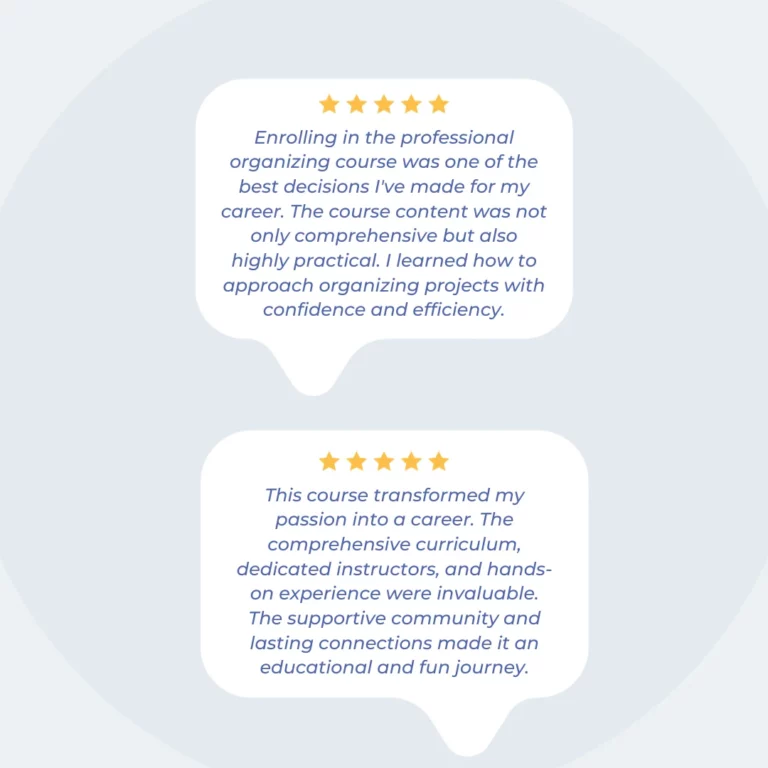10 Things To Consider When Choosing A
Professional Organizing Course
If you have a passion for organizing, an eye for detail, and a desire to help others streamline their lives, you might be considering a career as a professional organizer. The question, “How to choose a professional organizing course?” is a critical step in this journey.
Selecting the right course is essential for developing the skills and knowledge necessary to succeed in this field. This article provides clear and concise advice to help you navigate the options available. We will explore various course curriculums, compare online and in-person learning experiences, and offer insights from industry experts. Our aim is to empower you with the information needed to make an informed decision that aligns with your career goals.
Let’s dive into how you can choose the best professional organizing course for your aspirations.
Table of contents
- Assess Your Personal and Career Goals
- Evaluate the Course Curriculum and Topics Covered
- Minimum Requirements
- Consider Student Reviews and Testimonials
- Career Support and Networking Opportunities
- Hands-On Experience and Practical Training
- Online vs. In-Person Options
- Duration and Time Commitment
- Cost and Financial Considerations
- Post-Course Resources and Support
- FAQs in Relation to How to Choose a Professional Organizing Course
1. Assess Your Personal and Career Goals
When exploring how to choose a professional organizing course, begin by identifying your personal and career objectives. Understanding the type of professional organizer you aspire to become is crucial. This involves aligning your innate skills and interests, such as a natural talent for decluttering or a passion inspired by organizational shows, with specific career goals. Consider whether you are drawn to residential organizing for individual homes or if organizing corporate spaces appeals more to your professional aspirations.
Embarking on a career as a professional organizer involves more than just the initial interest; it requires a comprehensive understanding of various aspects, including client interaction, business management, marketing strategies, and expanding your customer base. It’s important to recognize that every expert starts as a beginner and that success comes with acknowledging and working on your strengths and weaknesses.
Reflect on key personal skills – your communication abilities, empathy towards clients with organizational challenges, and other relevant competencies. These are vital in shaping your effectiveness as a professional organizer. Your chosen training program should resonate with your goals and equip you with the necessary tools and knowledge, guiding you towards success in your chosen specialization in the field of professional organizing.
2. Evaluate the Course Curriculum and Topics Covered
Understanding the curriculum is a pivotal step in how to choose a professional organizing course that aligns with your career aspirations. Here’s what to keep an eye out for in a comprehensive program:
Solid Foundation in Organizing Principles
A well-rounded course should provide a solid grounding in key organizing principles. This includes learning various decluttering methods and how to implement efficient organizing systems. Mastery of these fundamental skills is essential for any professional organizer.
Incorporating Essential Organizing Theories
Look for courses that cover critical professional organizing theories such as ‘just-in-case’ vs. ‘just-in-time’ organization. These theories form the backbone of modern organizing practices and will give you a deeper understanding of different organizational approaches and philosophies.
Practical Experience in Real-World Settings
Theoretical knowledge should be complemented with practical applications. A quality course will offer ample opportunities to practice these skills in real-life situations. This hands-on experience is invaluable, as it helps solidify your understanding and prepares you for the realities of working as a professional organizer.
Understanding the Broader Impact
Recognize that professional organizing extends beyond just tidying spaces. It’s about transforming lives by reducing stress and enhancing productivity. Courses that explore the mental health aspects of professional organizing, as well as effective communication skills, can provide a more holistic understanding of the impact of your work.
Business, Sales, and Marketing Skills
In addition to organizing skills, a comprehensive course should include training in business, sales, and marketing. These skills are crucial for successfully launching and managing your organizing business, attracting and retaining clients, and differentiating yourself in the market.

3. Minimum Requirements
When pursuing a career as a professional organizer and selecting a professional organizing course, it’s important to look at the minimum course requirements. Generally, most courses prefer candidates to possess at least a high school diploma or equivalent. Many courses recommend that students be 18 years or older and possess strong communication skills, coupled with a keen interest in organizing systems, and a passion for assisting others in decluttering.
Experience requirements vary across courses. While some may require prior organizing experience or a minimum of 500 hours of paid client work for certification, others, like Ultimate Academy®, do not mandate previous professional organizing experience. Ultimate Academy® values the transferable skills acquired through diverse professional and life experiences, recognizing their potential in shaping successful professional organizers.
Be sure to verify any registration fees associated with the course before enrollment. This ensures clarity on all financial commitments required for your professional development in this field.
4. Consider Student Reviews and Testimonials
When choosing a professional organizing course, exploring student reviews is an invaluable step. These reviews provide essential insights into the course’s effectiveness and quality, offering a glimpse into the learning experiences of past students. They can highlight how well key concepts like organizing theory, marketing techniques, and communication skills were conveyed and comprehended.
Student testimonials are not only informative about the course content but also about practical aspects such as registration fees, course duration, and interaction with faculty members. These details are crucial in forming a comprehensive understanding of what to expect from the course and can significantly influence your decision-making process.
Additionally, beyond traditional review platforms, social media and professional networks like LinkedIn are excellent sources for candid feedback. Here, you can find discussions and posts from professionals about their experiences with various certification courses, providing real-world perspectives on the value and impact of the courses they have completed.
However, while these reviews and testimonials are helpful, it’s important to remember that personal experiences and learning styles vary. What suits one individual might not align with another’s needs and goals. Therefore, use these reviews as a guide but also trust your judgment and understanding of your professional objectives and learning preferences. This balanced approach will help you make an informed decision that best suits your aspirations and career path in professional organizing.

5. Career Support and Networking Opportunities
Networking and career support are vital elements in the development of a successful career as a professional organizer. While obtaining credentials is important, the connections made and support received during your educational journey are equally crucial.
When considering how to choose a professional organizing course, prioritize those that offer career support and networking opportunities. Look for courses that provide comprehensive business training, including mentorship, guidance in business name registration, marketing and branding strategies, and client communication support. For instance, Ultimate Academy® extends such support, ensuring a well-rounded preparation for business aspects of organizing.
Moreover, networking opportunities are fundamental for growth and collaboration in this field. For example, seek out courses that facilitate connections between alumni, such as dedicated social media groups or forums where graduates can share experiences, collaborate on projects, and offer mutual support. Another example is in-person networking events or seminars, which can be an excellent opportunity for meeting industry professionals and building relationships. This community aspect can provide a valuable network for future collaborations and referrals.
In summary, a course that combines career support with active networking opportunities equips you not only with professional organizing skills but also with the business acumen and community connections necessary for a thriving career in this field.
6. Hands-On Experience and Practical Training
Gaining practical experience is a crucial part of becoming a successful professional organizer. While theoretical knowledge lays the foundation, hands-on training is invaluable for skill development and application.
When selecting a professional organizing course, prioritize those that offer hands-on experience. This could range from organizing a designated space within the classroom to managing projects in your own or a friend’s or family member’s space. Such practical training allows instructors to evaluate and provide constructive feedback on your work, ensuring you are prepared to handle paid client projects professionally and effectively.
Firsthand experience is key to understanding the practical application of various organizing methods, going beyond theoretical knowledge. It helps you identify the most effective strategies for different clients, acknowledging that organizing solutions are not one-size-fits-all. Every client has unique needs and preferences, some requiring more guidance, while others may need minimal assistance but still value professional input.
A course that incorporates real-world organizing case studies prepares you not only in theory but also in practice, equipping you with the essential skills to meet diverse client requirements effectively.
7. Online vs. In-Person Options
Selecting the right professional organizing course often involves comparing online and in-person courses. Each option has distinct advantages, and understanding these can help you determine which suits your needs best.
Online Courses: Flexibility and Convenience
Online courses offer unparalleled flexibility. They are ideal for those balancing other commitments like work or family, as you can learn at your own pace, anytime, and anywhere. Beyond convenience, many online programs provide a comprehensive curriculum that is on par with in-person courses, ensuring a quality education.
In-Person Courses: Direct Interaction and Hands-On Training
In-person courses offer direct engagement with instructors and peers, which is crucial for networking and building relationships in the professional organizing community. They also facilitate hands-on training with real-time feedback, enhancing the learning experience. It’s important to note, however, that live online classes can offer these same experiences. Courses like those offered at Ultimate Academy® are designed to closely replicate the in-person experience. This is achieved through live feedback, class discussions, and interactive instruction. The benefit here is that you can have these experiences from the convenience of any location.
General Factors to Consider
Time Availability: If you require a flexible schedule, online courses may be more suitable. In contrast, in-person courses follow a more structured timetable.
Commuting Costs: Consider the expenses and time associated with traveling to a physical location for in-person courses.
Preference for Social Interaction: Some learners benefit from the interactive and collaborative environment of physical classrooms, while others may prefer the solitude and focus of online learning.
Remember, the effectiveness of a course depends more on the quality of its content than the mode of delivery. Whether online or in-person, a well-structured curriculum that covers all necessary aspects of professional organizing is key to a comprehensive education in this field.
8. Duration and Time Commitment
Embarking on a professional organizing career requires thoughtful consideration of the time commitment involved. The duration of professional organizer certificate courses can vary, ranging from a 1-week comprehensive course to several months, depending on the program’s intensity and your availability.
The time commitment isn’t limited to just the hours spent in class. You’ll also need to allocate time for completing assignments, quizzes, and exams. This is where choosing the right course format becomes crucial. For instance, Ultimate Academy® offers a flexible approach with recordings of live virtual classrooms and a self-paced home study option, allowing learners to revisit the material at their own pace and on their own time. This is particularly beneficial for those balancing other responsibilities like work or family.
For those looking to fast-track their journey, Ultimate Academy® also provides a live virtual professional organizing course. This option is ideal for aspiring professionals eager to obtain certification and start their organizing and entrepreneurial endeavors more quickly.
When selecting a course, remember that the time and effort you invest now will be instrumental in establishing your future organizing business. It’s less about the duration of the course and more about your commitment to learning and growing in this field.
9. Cost and Financial Considerations
Investing in a professional organizing course is a significant step in launching your career as a professional organizer. The cost of these courses can vary considerably, influenced by factors such as the provider, duration, and depth of the curriculum.
When evaluating the cost of a course, it’s important to consider what is included in the price. A lower-cost course might offer basic information through slides or notes, while a higher-priced course could provide comprehensive resources. These may include personalized tutoring, continually updated course content, extensive resource materials, vendor lists essential for the business, in-depth business training and free shipping of course materials.
View the expense of a professional organizing course as an investment in your future career. The value derived from a course isn’t just in the certification; it’s also in the knowledge, skills, and resources gained, which can significantly contribute to the success and growth of your professional organizing business. Therefore, carefully weigh what each course offers against its cost to make an informed decision that aligns with your career goals and provides the best value for your investment.
10. Post-Course Resources and Ongoing Support
When choosing a professional organizing course, it’s essential to consider the post-course resources and ongoing support offered. This aspect of a course can impact your long-term success and development in the field. After completing the course, you’ll want to have continued access to resources that can aid in your professional journey.
Look for courses that offer an alumni network, where you can connect with fellow graduates for collaboration, advice, and support. This network can be a valuable resource for sharing experiences, challenges, and successes. Additionally, check if the course provides ongoing access to learning materials, which can be a handy reference as you encounter diverse scenarios in your organizing career.
Consider whether the course offers any form of continued support or consultation, especially when starting your business. This support can be instrumental in navigating the early stages of your career, helping you apply your skills effectively, and overcoming any initial challenges.
In summary, a professional organizing course that extends beyond just the curriculum and provides comprehensive post-course resources and ongoing support can be invaluable in fostering a successful and evolving career in professional organizing.

FAQs for Choosing a Professional Organizing Course
To be a successful professional organizer, essential skills include excellent organizational and time management abilities, problem-solving, attention to detail, and creativity in space optimization.
Strong communication and empathy are crucial for effectively understanding and addressing clients’ needs. Adaptability and patience are also important, as each organizing project can vary significantly. Additionally, business and marketing skills are beneficial, especially for those planning to run their own organizing business.
If you feel you don’t possess some of these skills yet, enrolling in a professional organizing course can be an excellent way to develop them. These courses not only teach practical organizing techniques but also focus on developing interpersonal and business skills, preparing you comprehensively for a career in professional organizing.
While formal credentials are not always mandatory to become a professional organizer, having a certification can enhance credibility and expertise. Certifications from recognized organizing institutions or training companies can be valuable. These programs often cover essential organizing principles, business management, and client communication skills.
Research and choose a certification program that aligns with your career goals and offers comprehensive training in professional organizing.
To get started in professional organizing, begin by researching the field and understanding the required skills and potential market needs. Consider taking a professional organizing course to gain certification, knowledge, and credibility. Start practicing by organizing your own space or volunteering to organize for friends and family. This way, you can develop a portfolio of your work.
Networking with other professionals in the field can also provide valuable insights and opportunities. And when you feel ready, consider setting up a business, including creating a business plan, defining your services, and establishing a marketing strategy.
Yes, professional organizers are in demand. The increasing awareness of the benefits of organized living spaces and efficient work environments has led to a growing need for these services. Professional organizers are sought after by individuals looking to declutter their homes, businesses needing efficient space management, and people undergoing life transitions like moving or downsizing.
The demand can vary based on location and market trends, but the overall trend shows a consistent interest in professional organizing services.
Conclusion
Selecting the right professional organizing course is crucial to jumpstart your career in the professional organizing field. This article has highlighted key factors to consider in your decision-making process. It’s important to align your personal and career goals with your chosen course to achieve your objectives.
We’ve emphasized the need to evaluate the course curriculum, including its coverage of organizing principles and theories, and the value of reviewing past student testimonials to assess the course’s effectiveness.
Additionally, the significance of hands-on experience, financial aspects, understanding the target audience, and potential specializations within the course have been discussed.
In summary, when progressing towards a career as a professional organizer, these insights are vital. They guide you in selecting a course that imparts both essential knowledge and practical skills, aligned with your professional ambitions. The right course sets you on the path to a rewarding and successful career in professional organizing.





